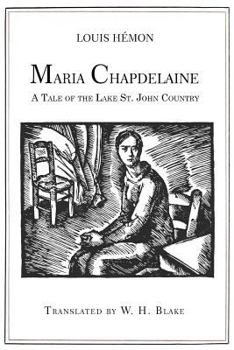Maria Chapdelaine: A Tale of the Lake St. John Country: Illustrated
Select Format
Select Condition 
Book Overview
Maria Chapdelaine , the quintessential novel of the rugged life of early French-Canadian colonists, is based on the author's experiences as a hired hand in the Saguenay-Lac-Saint-Jean area. A young... This description may be from another edition of this product.
Format:Paperback
Language:English
ISBN:1532721935
ISBN13:9781532721939
Release Date:April 2016
Publisher:Createspace Independent Publishing Platform
Length:152 Pages
Weight:0.55 lbs.
Dimensions:0.3" x 6.0" x 9.0"
Customer Reviews
1 rating
A timeless and universal story
Published by Thriftbooks.com User , 15 years ago
When recalling the past we tend to idealize it, to view it with fondness and nostalgia, and to hold them up as the best of times. But the question becomes, were those times really that good? Why do we recall them with such fondness? Why do we hold them up as a paragon for how we should live our lives today? Invariably we find some fault or failing of or present age, something we wish we could change. We idealize and objectify the past, remembering the good and forgetting the bad. "Maria Chapdelaine" is hardly a nostalgic trip down memory lane. The Quebecois who populate the book are living a hardscrabble life that wouldn't seem out of place in the American South, and yet the simple life is all they know. Like Southerners the Quebecois life revolves around family, farm, and faith. In some respects "Maria Chapdelaine" reminds me of Margaret Mitchell's "Gone with the Wind"; both are reflections on a society that is passing from remembrance, which is being changed by outside influences and events. Both authors wrote their novels as their societies were beginning to change and adapt to modernity and outside influences and they both served as a means of capturing the essence of the world that was passing from memory. And much like "Gone with the Wind", "Maria Chapdelaine" is about the concept of place, how you are perceived by others, and the role of community in enforcing conformity. While there is considerable difference in the central characters, the themes remain similar. Maria has to make choices that are shaped and informed by the environment she lives in. While Scarlet is rebellious, Maria is chaste and demure, the embodiment of the ideal of womanhood for Quebecois. Like Scarlet, Maria is conflicted over potential suitors, the adventurous Francois Paradis, fellow neighbor Eutrope Gagnon, and Lorenzo Suprenant, who has rejected the country for the city. This troika of suitors represent the three directions Quebec was being pulled in. All three men are symbolic representations of Quebec: Francois representing Quebec's voyageur past, Eutrope the present, and Lorenzo the future. Maria's heart is truly with Francois (the past), but when he meets and untimely end Maria ultimately rejects Lorenzo (the future), settling instead for Eutrope (the present). The world around Maria seeks to ratify the status quo, to glorify the ideals of family, farm, and faith. While it appears Maria wants to break free of that life and transcend it, those thoughts are nothing more than passing fancies. The passing of her mother amidst the trapping of their hardscrabble existence should have been motivation for Maria to chose Lorenzo and leave her environs, yet she sees her mother as the embodiment of perfect womanhood and knows she must stay. While Scarlet is headstrong, impulsive, and pragmatic, Maria is stoic, contemplative, and something of an idealist. To leave her family and her place would be a betrayal. She is as much a part of the land as is





